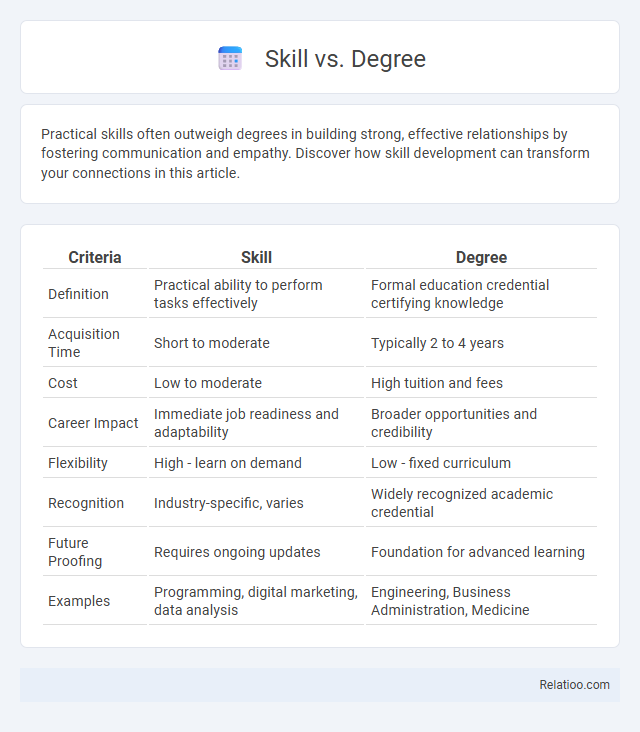Practical skills often outweigh degrees in building strong, effective relationships by fostering communication and empathy. Discover how skill development can transform your connections in this article.
Table of Comparison
| Criteria | Skill | Degree |
|---|---|---|
| Definition | Practical ability to perform tasks effectively | Formal education credential certifying knowledge |
| Acquisition Time | Short to moderate | Typically 2 to 4 years |
| Cost | Low to moderate | High tuition and fees |
| Career Impact | Immediate job readiness and adaptability | Broader opportunities and credibility |
| Flexibility | High - learn on demand | Low - fixed curriculum |
| Recognition | Industry-specific, varies | Widely recognized academic credential |
| Future Proofing | Requires ongoing updates | Foundation for advanced learning |
| Examples | Programming, digital marketing, data analysis | Engineering, Business Administration, Medicine |
Understanding Skill and Degree: Key Definitions
Understanding the key definitions of skill and degree is essential for effective career planning. A skill represents your practical ability to perform tasks, such as coding or communication, while a degree is an academic qualification that often validates foundational knowledge in a specific field. Your career planning becomes more strategic when you align your skills with the appropriate degree pathways to meet industry demands.
Historical Perspective: Evolution of Education and Skills
The historical evolution of education reveals a shift from traditional degree-based credentials to skill-oriented learning driven by industrial and technological advancements since the 19th century. The rise of vocational training and apprenticeships in the early 20th century emphasized practical skills over formal degrees, responding to changing labor market demands. In the 21st century, digital transformation accelerated the prominence of continuous skill development and agile career planning, challenging the once dominant role of academic degrees.
The Role of Degrees in Today’s Job Market
Degrees play a significant role in today's job market by providing foundational knowledge and signaling a candidate's commitment and discipline to employers. While skills are crucial for job performance and adaptability, degrees often serve as a gatekeeper for entry-level positions and professional certifications. Career planning should balance obtaining relevant degrees with continuous skill development to remain competitive and meet evolving industry demands.
Skills-Based Hiring: A Growing Trend
Skills-based hiring is transforming recruitment by prioritizing your practical abilities over formal degrees, leading to more inclusive and diverse workplaces. Companies increasingly assess competencies through practical assessments and portfolios, ensuring alignment with job requirements and boosting performance outcomes. This shift emphasizes continual skill development and targeted career planning, enabling you to adapt and thrive in evolving job markets.
Advantages of Formal Education (Degrees)
Formal education through degree programs provides structured learning, comprehensive knowledge, and recognized credentials that enhance employability and career advancement opportunities. Degrees often open doors to specialized fields and professional networks, offering access to internships, research opportunities, and industry connections. Employers frequently value degrees as a benchmark of foundational skills, critical thinking, and discipline, which can lead to higher earning potential and job stability.
The Power of Practical Skills in Career Growth
Practical skills are a critical factor in career growth, often outweighing formal degrees in many industries where hands-on expertise drives performance and innovation. Developing tangible abilities aligned with your career goals enhances employability, adaptability, and opportunities for advancement in a rapidly evolving job market. Your focus on skill acquisition can lead to more immediate results and sustained professional success than relying solely on academic credentials.
Skill Development: Methods and Strategies
Effective skill development requires targeted methods such as hands-on training, mentorship programs, and continuous learning through online courses and workshops. Incorporating real-world projects and feedback loops enhances practical expertise, while self-assessment tools help identify skill gaps for focused improvement. Strategic career planning integrates these skill-building activities with market demand analysis to ensure alignment with evolving industry needs.
Degree vs Skill: Employer Preferences
Employers increasingly prioritize skills over degrees when evaluating candidates, valuing practical experience and demonstrable competencies that directly impact job performance. While degrees provide foundational knowledge and signal formal education, skills highlight adaptability and problem-solving abilities essential in dynamic work environments. Consequently, career planning should emphasize continuous skill development alongside formal education to meet evolving employer demands.
Combining Skills and Degrees for Success
Combining practical skills with academic degrees enhances career planning by bridging theoretical knowledge and real-world application, increasing employability and adaptability in dynamic job markets. Employers prioritize candidates who demonstrate both specialized education credentials and relevant skills, such as critical thinking, communication, and technical proficiency. Strategic integration of skills development and degree attainment aligns career pathways with industry demands, fostering long-term professional growth and success.
Future Outlook: Skills or Degrees in a Changing World
In a rapidly evolving job market, skills such as digital literacy, critical thinking, and adaptability hold more predictive value for career success than traditional degrees alone. Employers increasingly prioritize practical, up-to-date skills that align with technological advancements and industry-specific demands. Future-proof career planning emphasizes continuous skill development through certifications, workshops, and hands-on experience to stay competitive in a dynamic world.

Infographic: Skill vs Degree
 relatioo.com
relatioo.com